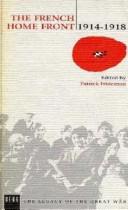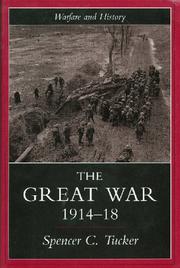| Listing 1 - 10 of 1285 | << page >> |
Sort by
|
Book
ISBN: 8122202586 9788122202588 Year: 2022 Publisher: Delhi Orient Paperbacks
Abstract | Keywords | Export | Availability | Bookmark
 Loading...
Loading...Choose an application
- Reference Manager
- EndNote
- RefWorks (Direct export to RefWorks)
World War, 1914-1918 --- World War (1914-1918). --- 1914-1918.

ISBN: 0854967702 Year: 1992 Publisher: Oxford Berg
Abstract | Keywords | Export | Availability | Bookmark
 Loading...
Loading...Choose an application
- Reference Manager
- EndNote
- RefWorks (Direct export to RefWorks)

ISBN: 1429410329 9781429410328 9780203137550 0203137558 9781857283907 1857283902 9781857283914 1857283910 0253333725 9780253333728 0253211719 9780253211712 9780415117135 0415117135 1857283902 1857283910 9781134817450 9781134817498 9781134817504 Year: 1998 Publisher: London UCL Press
Abstract | Keywords | Export | Availability | Bookmark
 Loading...
Loading...Choose an application
- Reference Manager
- EndNote
- RefWorks (Direct export to RefWorks)
An up-to-date and concise account of WWI for teachers and students looking for a balanced introduction. It details both the military operations as well as the development of war aims, alliance diplomacy and the war on the home front.
Book
ISBN: 1640122176 1640122192 9781640122178 9781640122192 9781640120020 1640120025 Year: 2019 Publisher: [Lincoln, Nebraska]
Abstract | Keywords | Export | Availability | Bookmark
 Loading...
Loading...Choose an application
- Reference Manager
- EndNote
- RefWorks (Direct export to RefWorks)
"Common Cause provides a nuanced fictional look at the home-front atmosphere in the midwestern United States before and during the Great War, exploring themes of patriotism, jingoism, and exclusion, with an introduction and explanatory notes to provide context"--
Book
ISBN: 1463231814 9781463231811 Year: 2010 Publisher: Piscataway, NJ
Abstract | Keywords | Export | Availability | Bookmark
 Loading...
Loading...Choose an application
- Reference Manager
- EndNote
- RefWorks (Direct export to RefWorks)
A rejection of the claims in Henry Morgethnthau’s memoirs which have been used to argue that there was a genocide committed against Armenians during WWI.
Book
ISBN: 0228007704 0228007690 9780228007708 9780228007692 9780228005766 0228005760 9780228006640 0228006643 Year: 2021 Publisher: Montreal Kingston London Ithaca
Abstract | Keywords | Export | Availability | Bookmark
 Loading...
Loading...Choose an application
- Reference Manager
- EndNote
- RefWorks (Direct export to RefWorks)
Based on extensive research in French political and military archives, this new in-depth study of Anglo-French military relations on the Western Front in 1915 fills a major gap in the unfolding drama of the First World War.
Book
ISBN: 1839673486 9781839673481 Year: 2020 Publisher: [S.I.] Portable Poetry
Abstract | Keywords | Export | Availability | Bookmark
 Loading...
Loading...Choose an application
- Reference Manager
- EndNote
- RefWorks (Direct export to RefWorks)
Mark Plowman, but known as Max Plowman, was born in Northumberland Park, Tottenham, Middlesex on 1st September 1883. At 16 he left school and took up a position with his father's brick business before becoming a journalist and poet. Politically Plowman was opposed to fighting in the war and embraced pacifist beliefs. He called it "insane and unmitigated filth" but despite his stance, and his marriage earlier in the year to Dorothy Lloyd Sulman, on Christmas Eve 1914 he reluctantly volunteered for enlistment in the Territorial Army, Royal Army Medical Corps and 4th Field Ambulance. He later accepted a commission in the 10th Battalion, Yorkshire Regiment, and serving at Albert, near to the Somme on the Western Front, he suffered concussion from an exploding shell. He was sent home to convalesce at Bowhill Auxiliary, a branch of Craiglockhart, where he was treated by W. H. R. Rivers, who had earlier treated the War Poets, Wilfred Owen and Siegfried Sassoon. In 1917 Plowman produced a poetry collection, 'A Lap Full of Seed', and an anonymous pamphlet, 'The Right to Live', arguing against the kind of society that made war inevitable. Having been granted a further month's home service in January 1918, he wrote to his battalion adjutant asking to be relieved of his commission on the grounds of a religious conscientious objection to all war. This went badly for him. Plowman was arrested and tried by court martial on 5th April 1918 for refusing to return to his unit. He was dismissed from the Army without punishment. However, subsequent to this he was, on 29th June 1918, served with notice of call-up as a conscript, but successfully applied to Hampstead Military Service Tribunal for exemption as a conscientious objector. This would now be the theme of his life. His memoir of the war 'A Subaltern on the Somme' was published in 1928, under the pseudonym "Mark VII". In 1930 Plowman joined John Middleton Murry and Richard Rees in positioning The Adelphi publication as a socialist monthly with a commitment to pacifism and aligned with Independent Labour Party. Plowman also found the time and energy to write for other publications including 'The New Age', 'Peace News', 'Twentieth Century', 'Now and Then' and the Theosophical journal 'The Aryan Path'. Plowman co-founded in 1934 and ran an early commune, the Adelphi Centre, based at a farm in Langham, Essex acquired by Middleton Murry. Although it was short lived it did run a star studded Summer School in August 1936: George Orwell (who years before had reviewed books for them) spoke on 'An Outsider Sees the Distressed Areas' on 4th August. Other speakers were Steve Shaw, Herbert Read, Grace Rogers, J. Hampden Jackson, N. A. Holdaway (a Marxist theorist and schoolmaster, and a Director of the Centre), Geoffrey Sainsbury, Reinhold Niebuhr, Karl Polanyi, John Strachey, Plowman and Common. Despite this by 1937 the commune had collapsed, and the house, 'The Oaks', was used to house 64 Basque refugee children under the auspices of the Peace Pledge Union who stayed until 1939. Plowman was attracted into organising for pacifism in the later 1930s and became the first General Secretary of the Peace Pledge Union (1937-1938). He spoke of what would soon be clear signs of the horrors that Europe and the rest of the world would be engulfed in. Plowman emphasised the importance of the individual conscience in an age of totalitarianism: 'I am confident that if a man surrenders his conscience to his idea of community, or to his Fuhrer, it doesn't must matter whether he calls himself Communist or Fascist-he has foresworn the element in himself which alone can keep society human. And for want of that element, society must and will inevitably grow more and more barbarous. You can see it happening'. Max Plowman died on 3rd June 1941.
Book
ISBN: 0870207830 9780870207839 9780870207822 Year: 2017 Publisher: Madison, WI
Abstract | Keywords | Export | Availability | Bookmark
 Loading...
Loading...Choose an application
- Reference Manager
- EndNote
- RefWorks (Direct export to RefWorks)
"Wisconsin responded to the nation's entry into World War I with loyalty and patriotic fervor. Wisconsinites of all ages and backgrounds made sacrifices, lost loved ones, endured shortages, bought war bonds, grew vegetables in victory gardens, volunteered for the Red Cross, and went to work in war factories. While Wisconsinites supported the war effort in ways too numerous to count, they also debated the wisdom of war, the necessity of conscription, how to fund the war, and the constitutionality of civil liberty restrictions"--
Book
ISBN: 9798216168676 1440863695 9781440863691 9781440863684 9781440863707 9781440863714 Year: 2019 Publisher: Santa Barbara, California
Abstract | Keywords | Export | Availability | Bookmark
 Loading...
Loading...Choose an application
- Reference Manager
- EndNote
- RefWorks (Direct export to RefWorks)
Book
ISBN: 147251081X 1474211038 1472508858 9781472508850 9781472511249 9781472512505 9781472510815 Year: 2014 Publisher: London ; New Delhi ; New York : Bloomsbury,
Abstract | Keywords | Export | Availability | Bookmark
 Loading...
Loading...Choose an application
- Reference Manager
- EndNote
- RefWorks (Direct export to RefWorks)
"The Great War toppled four empires, cost the world 24 million dead, and sowed the seeds of another worldwide conflict 20 years later. This is the only book in the English language to offer comprehensive coverage of how Germany and Austria-Hungary, two of the key belligerents, conducted the war and what defeat meant to them. This new edition has been thoroughly updated throughout, including new developments in the historiography and, in particular, addressing new work on the cultural history of the war. This edition also includes: New material on the domestic front, covering Austria-Hungary's internal political frictions and ethnic fissures More on Austria-Hungary and Germany's position within the wider geopolitical framework Increased coverage of the Eastern front The First World War: Germany and Austria-Hungary, 1914-1918 offers an authoritative and well-researched survey of the role of the Central powers that will be an invaluable text for all those studying the First World War and the development of modern warfare."--Bloomsbury Publishing.
| Listing 1 - 10 of 1285 | << page >> |
Sort by
|

 Search
Search Feedback
Feedback About UniCat
About UniCat  Help
Help News
News